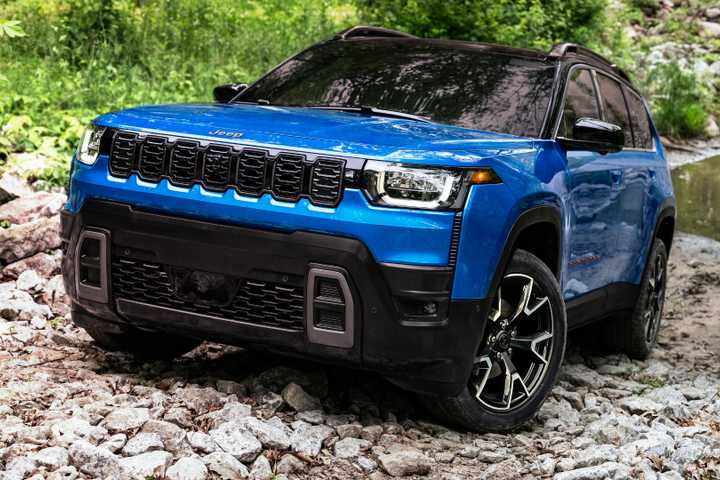The Cherokee has represented practical and affordable, family-friendly off-roading in Jeep’s lineup for over 40 years. Originally launched as a two-door variant of the Jeep Wagoneer in the 1970s, the Cherokee as we know it was reintroduced in 1984 and quickly became a staple of suburban life. Smaller than the Wagoneer and more practical than the Wrangler, it started the SUV craze that saw soccer moms abandon their station wagons and minivans for something more rugged. Since then, it’s been a favorite of families, adventurers, and commuters alike. But as the auto industry pivots toward electrification, even icons must adapt.


- Base Trim Engine
-
1.6L I4 Hybrid
- Base Trim Transmission
-
1-speed CVT
- Base Trim Drivetrain
-
Four-Wheel Drive
- Base Trim Battery Type
-
Lithium ion (Li-ion)
- Make
-
Jeep
- Model
-
Cherokee
- Segment
-
Compact SUV
Consumer demand and government regulations are reshaping the SUV landscape. Buyers are increasingly conscious of fuel economy, emissions, and long-term running costs, while regulators are tightening standards. Against this backdrop, Jeep has been expanding its hybrid and plug-in hybrid offerings—Wrangler 4xe, Grand Cherokee 4xe, and the fully electric Wagoneer S all point to a future with more electrified choices.
The 2026 Jeep Cherokee is the latest chapter in this transition. For the first time, the Cherokee will feature a hybrid powertrain, pairing a gas engine with an electric motor. While it won’t be a plug-in hybrid (PHEV), the move signals Jeep’s intent to modernize its lineup while staying true to its adventurous, go-anywhere spirit.
To provide the most up-to-date and accurate information possible, the data used to compile this article was sourced from Jeep and other authoritative sources, including the EPA, J.D. Power, Car and Driver, and Edmunds.
The Legacy Of The Jeep Cherokee
An SUV That Evolved To Fit The Times
The Jeep Cherokee’s story is central to the evolution of the SUV segment itself. When the second-generation model arrived in 1984, it effectively created the modern, family-oriented SUV: a unibody vehicle with rugged looks, off-road capability, and everyday usability. Unlike body-on-frame vehicles like the larger Ford Bronco and Chevrolet Blazer, the Cherokee combined a more car-like ride and handling with Jeep’s tough off-road capability. That combination proved very popular, leading to the advent of similar vehicles, including the Ford Explorer, Nissan Pathfinder, and Toyota 4Runner.
In the ensuing decades, the Cherokee maintained those attributes while remaining popular with buyers. Most recently, it’s played a prominent role in Jeep’s lineup, providing a bridge between the larger Grand Cherokee and smaller Compass, offering a sweet spot in terms of size, performance, and affordability. It remained an attractive proposition for families thanks to its practicality, while outdoor enthusiasts valued its available four-wheel-drive systems and off-road prowess.
Changing With The Times Has Kept The Cherokee Fresh
The Cherokee has remained relevant by adapting to changing consumer preferences. It’s grown in size, gained tech features, and undergone major and minor styling changes to keep up with the times. As a result, it remains a key part of Jeep’s lineup, offering buyers something more capable than a sedan or wagon while remaining more than just an urban crossover. It’s ideal for people who want to go off-road occasionally but don’t want a rough-and-ready full-size SUV that delivers a punishing on-road ride. The new 2026 version continues this tradition, evolving to meet today’s demands for the latest technology and improved fuel efficiency.
The 2026 Cherokee Is An Updated Take On Jeep’s Classic Formula
The 2026 Cherokee Is Sharper And More Modern, Both Inside And Out
Earlier this year, Jeep announced it was bringing back the Cherokee for 2026. The latest version of the Cherokee reflects Jeep’s current design language with sleeker lines and aerodynamic tweaks while retaining rugged looks. A slimmer interpretation of the signature seven-slot grille, flanked by LED headlights, gives the Cherokee a more high-tech appearance that is unmistakably a Jeep. Sculpted body sides and a slightly lower roofline improve aerodynamics without compromising its familiar stance. Like Cherokees of old, it’s a Jeep that looks tough but also optimized for today’s needs.
New Digital Displays With Modern Safety And Infotainment Features
Inside, the Cherokee makes a big leap forward. Like the recently refreshed Jeep Grand Cherokee, the smaller Cherokee embraces a glass instrument panel, with a fully digital gauge cluster, a larger central infotainment screen, and wireless Apple CarPlay/Android Auto. Materials are improved across all trims, with soft-touch surfaces, better stitching, and available premium finishes. Tech upgrades include advanced driver-assistance features, over-the-air updates, and customizable drive modes.
A Larger, More Practical Interior
Practicality remains a core part of the Cherokee’s formula. The 2026 model offers accommodating rear seat space for adults, with improved ergonomics and thoughtful storage throughout the cabin. Cargo capacity grows slightly compared to the outgoing model, thanks to efficient packaging of the Cherokee’s new powertrains. Jeep made sure the SUV remains as useful for running errands as well as off-road adventures.
The First-Ever Hybrid Cherokee
The biggest change, of course, is under the hood. The 2026 Cherokee introduces Jeep’s first traditional hybrid for the model. A gasoline engine pairs with an electric motor and a small battery pack to improve efficiency and provide extra torque when needed.
Unlike the Wrangler 4xe, the Cherokee hybrid is not a plug-in hybrid. Instead, it self-charges through regenerative braking and engine operation, requiring no charging infrastructure. This approach makes the Cherokee hybrid an accessible step into electrification for Jeep buyers who want better fuel economy with the straightforward ease of use provided by a conventional hybrid powertrain.
Why No Plug For The Cherokee?
The decision to launch the Cherokee as a traditional hybrid rather than a PHEV was intentional and pragmatic. Jeep understands its customer base: buyers who value rugged capability and practicality above all. These customers may not have regular access to public charging or want to deal with the cost and complexity of a home charging system.
By going with a self-charging hybrid, Jeep delivers noticeable improvements in fuel economy and performance without changing the ownership experience. Fill it with gas, drive it like any other regular SUV, and enjoy the efficiency gains.
This strategy also fits Jeep’s broader electrification roadmap. The Wrangler 4xe and Grand Cherokee 4xe already cover the PHEV segment, appealing to buyers who want electric-only range for daily commuting. Meanwhile, the upcoming Wagoneer S and Recon EV will serve customers ready for fully electric SUVs. The Cherokee hybrid covers a vast swath of the middle ground, providing an efficient, affordable hybrid that meets the needs of mainstream SUV buyers.
Fuel Economy And Comparison With Rivals
While official EPA ratings aren’t yet finalized, Jeep expects significant gains over the outgoing Cherokee’s V6 and turbo-four engines. Early estimates suggest the 2026 Cherokee hybrid could deliver around 36 mpg city / 34 mpg highway / 35 mpg combined, a substantial leap from the mid-20s of the current lineup. This efficiency puts the Cherokee in direct competition with other established SUV hybrid leaders.
Hybrid SUVs Fuel Economy Comparison
|
Model |
City Fuel Economy |
Highway Fuel Economy |
Combined Fuel Economy |
|
Jeep Cherokee |
36 mpg |
34 mpg |
35 mpg |
|
Toyota RAV4 |
41 mpg |
38 mpg |
40 mpg |
|
Honda CR-V |
43 mpg |
36 mpg |
40 mpg |
|
Ford Escape |
42 mpg |
36 mpg |
39 mpg |
On paper, Toyota, Honda, and Ford may retain a slight edge in efficiency, but Jeep counters with something they can’t fully replicate: an authentic Jeep ownership experience. The Jeep brand still has significant cache. With available four-wheel-drive systems, advanced traction management, and rugged hardware, the Cherokee remains one of the few hybrids designed to handle real off-road conditions. For buyers who want both efficiency and trail-readiness, the Cherokee is a standout option.
2026 Cherokee Hybrid Trims, Pricing, And Availability
Jeep plans to offer the hybrid system across the Cherokee lineup rather than restricting it to a niche trim. This means even the entry-level model will feature hybrid power, ensuring efficiency improvements are available to all buyers. Expected trims will follow Jeep’s familiar structure:
- Laredo
- Limited
- Overland
- Trailhawk (possibly)
Each trim offers its own blend of features, luxury, and off-road capability. The Overland, in particular, will showcase how Jeep integrates hybrid power with rugged hardware—expect enhanced low-end torque for crawling along with improved fuel efficiency for both long on and off-road trips.
As for pricing, the base 2026 Cherokee will start around $35,000, with the Laredo starting at $38,595, and the Limited and Overland starting at $41,095 and $44,595, respectively, putting the Cherokee in line with its direct competitors. The higher price reflects the added cost of the hybrid powertrain, technological enhancements, and upgraded interior features as opposed to the previous model. As with other Jeeps, each trim level comes with plenty of available options, making it easy to customize the Cherokee for individual preferences.











